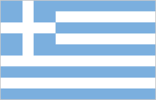Compare
San Marino
to
Greeceto
GreeceGreece has an unemployment rate of 26.60% while San Marino has 8.70%
This entry contains the percent of the labor force that is without jobs.
Source:
CIA World Factbook
120 in every 100,000 people are currently imprisoned in Greece compared to 6 in San Marino
This entry contains the number of people in penal institutions, including pre-trial detainees. Comparability is hampered by differences in local practice, including whether psychiatrically ill offenders are under the authority of the prison administration. People held in a form of custody not under the authority of a prison administration are not included in this figure.
Source:
International Centre for Prison Studies
Per capita public and private health expenditures combined in Greece are $2,044.30 USD while San Marino spends $3,791.80 USD
This entry contains the per capita public and private health expenditure at purchase power parity using US Dollars. This figure combines government, personal, and employer spending on health care
Source:
World Health Organization
The life expectancy at birth in Greece is 80.30 while in San Marino it is 83.18.
This entry contains the average number of years to be lived by a group of people born in the same year, if mortality at each age remains constant in the future. The entry includes total population as well as the male and female components. Life expectancy at birth is also a measure of overall quality of life in a country and summarizes the mortality at all ages. It can also be thought of as indicating the potential return on investment in human capital and is necessary for the calculation of various actuarial measures.
Source:
CIA World Factbook
The number of deaths of infants under one year old in a given year per 1,000 live births in Greece is 4.78 while in San Marino it is 4.52.
This entry gives the number of deaths of infants under one year old in a given year per 1,000 live births in the same year; included is the total death rate, and deaths by sex, male and female. This rate is often used as an indicator of the level of health in a country.
Source:
CIA World Factbook
The annual number of births per 1,000 people in Greece is 8.80 while in San Marino it is 8.70.
This entry gives the average annual number of births during a year per 1,000 persons in the population at midyear; also known as crude birth rate. The birth rate is usually the dominant factor in determining the rate of population growth. It depends on both the level of fertility and the age structure of the population.
Source:
CIA World Factbook
 With its 10,775,557 people, Greece is the
80th largest country in the world by
population. It is the 97th largest country in the
world by area with 131,957 square kilometers.
With its 10,775,557 people, Greece is the
80th largest country in the world by
population. It is the 97th largest country in the
world by area with 131,957 square kilometers.
Greece achieved independence from the Ottoman Empire in 1830. During the second half of the 19th century and the first half of the 20th century, it gradually added neighboring islands and territories, most with Greek-speaking populations. In World War II, Greece was first invaded by Italy (1940) and subsequently occupied by Germany (1941-44); fighting endured in a protracted civil war between supporters of the king and other anti-communist and communist rebels. Following the latter's defeat in 1949, Greece joined NATO in 1952. In 1967, a group of military officers seized power, establishing a military dictatorship that suspended many political liberties and forced the king to flee the country. In 1974, democratic elections and a referendum created a parliamentary republic and abolished the monarchy. In 1981, Greece joined the EC (now the EU); it became the 12th member of the European Economic and Monetary Union in 2001. In 2010, the prospect of a Greek default on its euro-denominated debt created severe strains within the EMU and raised the question of whether a member country might voluntarily leave the common currency or be removed.
Check out the recommended reading list below for great sources of information on Greece